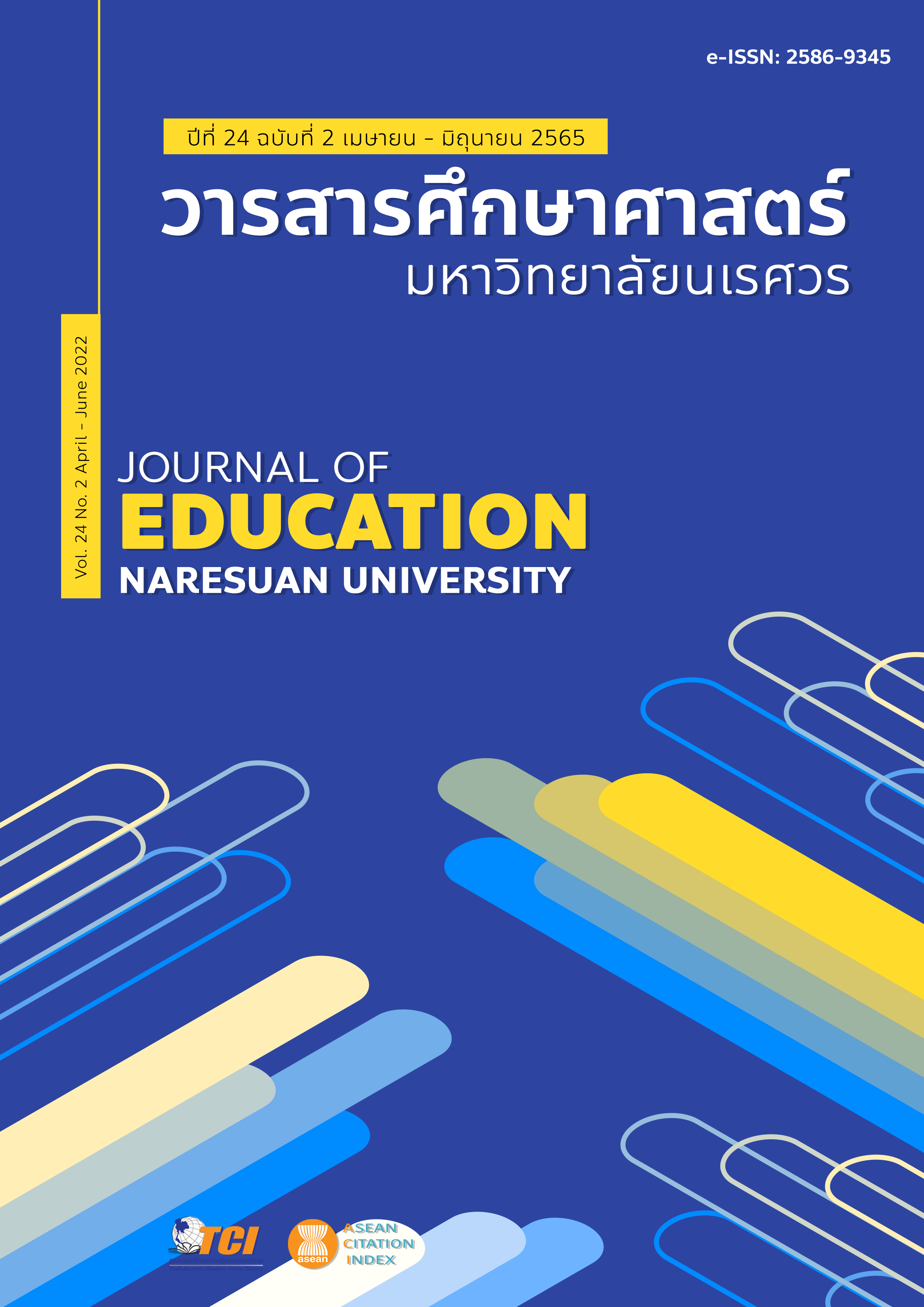CURRICULUM DEVELOPMENT INNOVATION OF PRIMARY SCHOOL BASED ON THE CONCEPT OF COLLABORATIVE EVALUATION AND STEM EDUCATION GOALS นวัตกรรมการพัฒนาหลักสูตรโรงเรียนประถมศึกษาตามแนวคิดการประเมินแบบร่วมมือและเป้าหมายของสะเต็มศึกษา
Main Article Content
Abstract
This research objectives were 1) to study the modified priority needs index of the primary school curriculum development, 2) to study the good practices of primary school curriculum development, and 3) to develop the curriculum development innovation of primary school based on the concept of collaborative evaluation and STEM education goals. The population is 26 primary STEM schools. Data were collected from the total population. The respondents consisted of 1) 208 stakeholders of 26 schools, consisted of 26 school administrators, 52 teachers, 52 parents, and 78 community members, 2) 30 stakeholders of 5 schools with good practice, consisted of 5 school administrators, 5 teachers, 5 parents, and 15 community members, and 3) 9 experts, consisted of 2 STEM experts, 1 collaborative evaluation expert, 1 innovation development expert, and 5 school administration experts. The research tools consisted of a questionnaire, an interview form, and an assessment form. The statistics used in data analysis were mean, standard deviation, content analysis, and PNImodified. The research revealed that:
1. The greatest needs for developing primary school curriculum based on the concept of collaborative evaluation and STEM education goals is the development of curriculum by collecting information from all stakeholders on the integration of knowledge in solving daily problems. (PNImodified = .111)
2. Good practices for developing primary school curriculum based on the concept of collaborative evaluation and STEM Education Goals consist of 4 guidelines consisted of Real-world integration curriculum designing, Interdisciplinary curriculum designing, Technology integration curriculum designing, and Student proficiency-based curriculum designing.
3. The curriculum development innovation of primary school based on the concept of collaborative evaluation and STEM education goals consist of Curriculum goals, Curriculum principles, Students’ key competencies, and Curriculum development flow chart.
Article Details

This work is licensed under a Creative Commons Attribution-NonCommercial-NoDerivatives 4.0 International License.
The owner of the article does not copy or violate any of its copyright. If any copyright infringement occurs or prosecution, in any case, the Editorial Board is not involved in all the rights to the owner of the article to be performed.
References
Aiumdee, S., Chaiyagij, M., Ngrorangsri, K., & Chanchalor, S. (2013). The development of the participative education networks system under the Management of Primary Educational Service Area Offices. Journal of Education Naresuan University, 15(Special Edition), 216-224. [in Thai]
Asawapoom, A. (2008). Modern education management: concepts, theory, and practice. Ubon Ratchathani: Ubonkit Offset Press. [in Thai]
Bloom, B. S., Krathwohl, D. R., & Masia, B. B. (1984). Bloom taxonomy of educational objectives. Allyn and Bacon: Pearson Education.
Boonprasert, P., & Jantarapanya, P. (2018). Parental participation of private kindergarten students: analysis of expectations and process creation for parental participation, case study of Daroonnimit Kindergarten. EAU Heritage Journal Social Science and Humanities, 12(1), 125-136. [in Thai]
Burke, B. (1998). Evaluating for a change: Reflections on participatory methodology. New Directions for Evaluation, 80, 43-56.
Chaowachote, S., & Kessadayurat, C. (2016). Managing Relationship in a Nursery School. Journal of Business, Economics and Communications, 11(1), 69-82. [in Thai]
Deal, T. E., & Peterson, K. D. (2007). Eight roles of symbolic leaders. The Jossey-Bass Reader on Educational Leadership, 197-209.
Fetterman, D. M., & Wandersman, A. (2005). Empowerment evaluation principles in practice. New York: Guilford Publications.
Guba, E. G., & Lincoln, Y. S. (1989). Fourth generation evaluation. Newbury Park, Calif: Sage Publications
Hong, O. (2017). STEAM education in Korea: Current policies and future directions. Science and Technology Trends Policy Trajectories and Initiatives in STEM Education, 8(2), 92-102.
Johnson, C. C., Burton, P., Moore, E., Tamara, J. (2015). STEM road map: A framework for integrated STEM education. New York, NY: Routledge.
Klomim, K. (2019). STEM education curriculum development. Phitsanulok: Ratanasuwan Printing. [in Thai]
Lewkowicz, J. A., & Nunan, D. (1999). The limits of collaborative evaluation. Tesol Quarterly, 33(4), 681-700.
Moore, T. J., Guzey, S. S., & Brown, A. (2014). Greenhouse design to increase habitable land: An engineering unit. Science Scope, 37(7), 51-57.
National Research Council. (2011). Successful K-12 STEM education: Identifying effective approaches in science, technology, engineering, and mathematics: National Academies Press.
National Science Board. (2007). A national action plan for addressing the critical needs of the US science, technology, engineering, and mathematics education system. National Science Foundation.
Office of the Education Council. (2016). Policy proposals for promoting STEM education in Thailand (Research report). Bangkok: Prigwarn Graphic. [in Thai]
Office of the Education Council. (2018). National education standards B.E. 2561. Bangkok: Office of the Education Council. [in Thai]
O'Sullivan, R. G. (2004). Practicing evaluation: A collaborative approach. Thousand Oaks, CA: SAGE.
Vasquez, J. A., Sneider, C. I., & Comer, M. W. (2013). STEM lesson essentials, grades 3-8: Integrating science, technology, engineering, and mathematics. Portsmouth, NH: Heinemann.
Young, J., Shaxson, L., Jones, H., Hearn, S., Datta, A., & Cassidy, C. (2014). Rapid outcome mapping approach: A guide to policy engagement and influence. London, UK: Overseas Development Institute (ODI).


